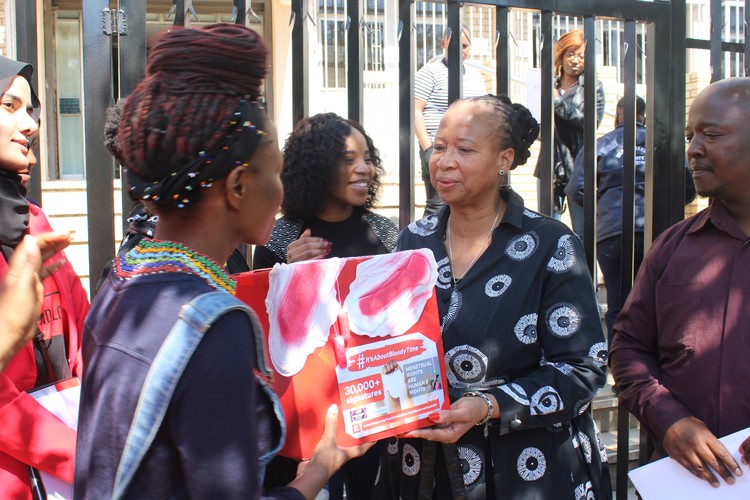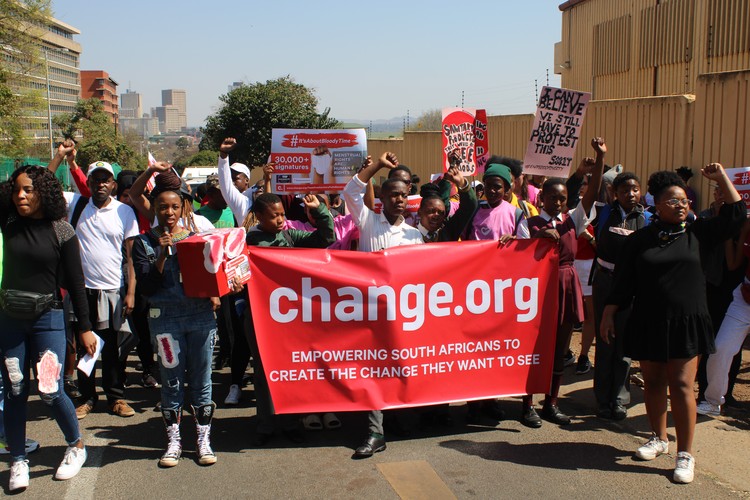Learners march to demand free sanitary pads
Team Free Sanitary Pads campaign has so far collected over 30,000 signatures to get government to improve menstrual health
Nokuzola Ndwandwe of Team Free Sanitary Pads hands over the petition to representatives from the Department of Women, Youth and Persons with Disabilities after the march in Pretoria. Photos: Kimberly Mutandiro
- School learners and activists marched to the Department of Women, Youth and Persons with Disabilities in Pretoria to demand that the government address and recognise menstrual rights.
- The Team Free Sanitary Pads campaign, supported by several other oragnisations, says it has to date collected over 30,000 signatures.
- They are also calling for better access to information at schools about menstrual health and access to free menstrual products, among other things.
Dikeledi, a grade 9 learner from Mamelodi in Pretoria, says she gets anxious every month when her menstrual cycle approaches. Her family, like countless others who are poor and low-income, can’t always afford to pay R14 for a basic pack of sanitary pads. This means she either has to use unhealthy substitutes like newspapers and old rags or miss days at school.
Although her school keeps a supply of pads, Dikeledi says they are expected to buy the pads which they often can’t afford. “To some of us buying sanitary pads is a luxury. This is why we want the government to make free sanitary pads available in schools,” says Dikeledi.
On 26 August, Dikeledi joined over 50 learners and activists who marched under the campaign #it’sAboutBloodyTime from the Union Buildings to the Department of Women, Youth and Persons with Disabilities in Pretoria. They handed over a petition signed by over 30,000 people to date, demanding that the government address and recognise menstrual rights.
The demands in the petition include that there be better access to information at schools about menstrual health and access to free menstrual products. They want increased access to water, sanitation and disposal facilities for those with chronic menstrual related conditions through the departments of health and water and sanitation. They also called for gender equality and job creation through the production of local sanitary pad initiatives, and for the government to implement policies to boost menstrual health.
Several other organisations participated, including Women’s Health Ekklesia, Femconnect and others.
“Access to sanitary dignity is a human right … We urge the government together with members of Parliament to make [menstrual health bill] a reality,” the memo read.
About 50 learners and activists march under the campaign #It’sAboutBloodyTime from the Union Buildings on Friday to demand government prioritise menstrual health and free sanitary pads.
Nokuzola Ndwandwe, founder of Team Free Sanitary Pads, started the campaign in 2017 after her own experience with a menstrual illness.
“It is time to deconstruct the narrative to end the stigma by educating men and women about period poverty,” she said.
“As a result of the campaign the government set aside R157-million to eradicate period poverty at school,” said Ndwandwe. She noted that Scotland has introduced legislation to make sanitary products freely available.
Ahmed Kathrada Foundation’s Irfaan Mangera runs a campaign called Free to Flow where they distribute free pads to communities. He said they do not have enough to meet the high demand for free sanitary products.
Menstruation activist, Candice Chirwa said, “The recognition of menstrual health is a matter of justice and dignity,” Chirwa said some of her research has found that women use cow dung and leaves in countries such as Kenya. This has serious health implications.
The Department’s Acting Director-General Welhemina Tshabalala accepted the memo.
Support independent journalism
Donate using Payfast

Next: Taxi drivers bully Centurion community into stopping protest
Previous: KZN south coast tourism threatened by water failures
© 2022 GroundUp. This article is licensed under a Creative Commons Attribution-NoDerivatives 4.0 International License.
You may republish this article, so long as you credit the authors and GroundUp, and do not change the text. Please include a link back to the original article.
We put an invisible pixel in the article so that we can count traffic to republishers. All analytics tools are solely on our servers. We do not give our logs to any third party. Logs are deleted after two weeks. We do not use any IP address identifying information except to count regional traffic. We are solely interested in counting hits, not tracking users. If you republish, please do not delete the invisible pixel.


